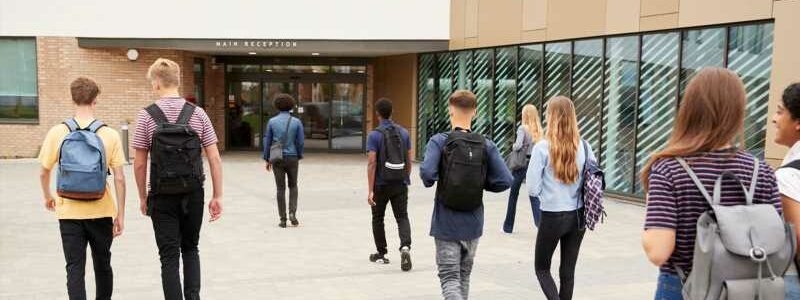
COVID-19: Campaign launched to encourage students to get tested regularly when schools return
A drive to persuade secondary school and college pupils to get tested for coronavirus regularly and ensure they are vaccinated where possible has been launched by the government.
The campaign, which comes ahead of the start of the autumn term and includes a radio advert and promotion on social media, is backed by an Olympic champion and a TV doctor.
Its aim is to persuade parents, secondary school and college students to take part in voluntary asymptomatic COVID-19 testing.
Ministers say regular testing will help to minimise disruption to pupils’ learning in the weeks and months to come.
“I have every confidence that school and college staff, parents and students will continue to work together admirably, following pragmatic measures like testing and vaccinations to minimise disruption and keep children where they belong – in the classroom,” Education Secretary Gavin Williamson said.
This was echoed by Health Secretary Sajid Javid, who said: “I urge parents to encourage their children to take regular tests, to help break chains of transmission and stop the virus spreading.”
The drive is being backed by 18-year-old swimmer Matthew Richards, who won gold at the 2020 Tokyo Olympics, and NHS consultant paediatrician and TV presenter Dr Ranj Singh.
Mr Richards told students: “Make sure you test before you go back, and twice weekly – even if you don’t have symptoms – so you can get back to the things you love like competitive sports and school matches.”
Guidance from the Department for Education says secondary school and college pupils in England should be tested twice when they go back, with lateral flow tests taken between three and five days apart.
Pupils are then encouraged to keep testing themselves twice a week at home until the end of September, at which point there will be a review of the policy.
In addition, students who are aged 16 and 17 are being encouraged to get their COVID vaccine.
Schools were given guidance in July about the measures they should introduce from September, including keeping increased hygiene and ventilation.
However, year group “bubbles” and face coverings have been scrapped.
Another change is that children no longer have to isolate if they come into contact with someone who tests positive for the virus.
They will need to take a PCR test and will only have to isolate if they themselves test positive for COVID.
The DfE’s “remote education direction” is also being reissued, a directive which requires schools to offer immediate access to high-quality online learning for students who need to isolate.
Attendance advisers are being recruited to work with councils and multi-academy trusts where absence rates are above the average, the department said.
But unions have expressed concerns.
Geoff Barton, general secretary of the Association of School and College Leaders (ASCL), said the guidance is “very different from the last academic year” and described the COVID measures that will be in place as “less stringent”.
“Our concerns are over the potential risk of a high number of infections among pupils which cause more educational disruption and may lead to some young people suffering serious symptoms,” he said.
Nick Brook, deputy general secretary of school leaders’ union NAHT, said they wanted more than “warm words” from ministers and what he said was a “hope for the best” approach, adding the government “must do everything in its power to ensure that schools are kept as safe as possible so that as few children as possible miss out on education this year”.
Kevin Courtney, joint general secretary of the National Education Union, also expressed scepticism, saying: “This charm offensive from government to parents relies on the notion that the removal of safety requirements will magically transform school and college life.
“However, its admission last week that CO2 monitors will be needed should be sufficient evidence that Gavin Williamson made a bad call when removing so many mitigations last term – and, once again, squandered the summer break.”
Source: Read Full Article


